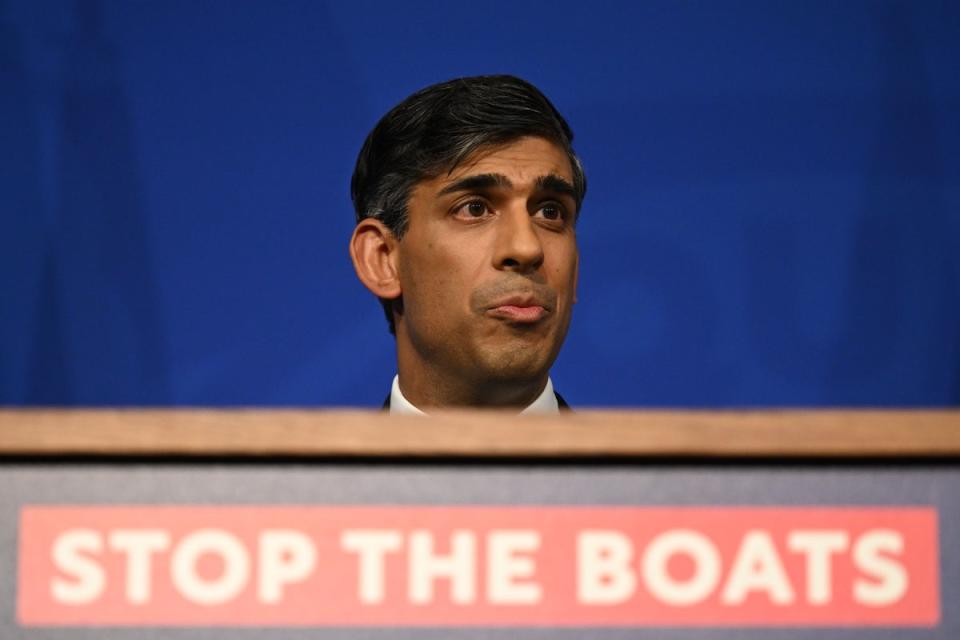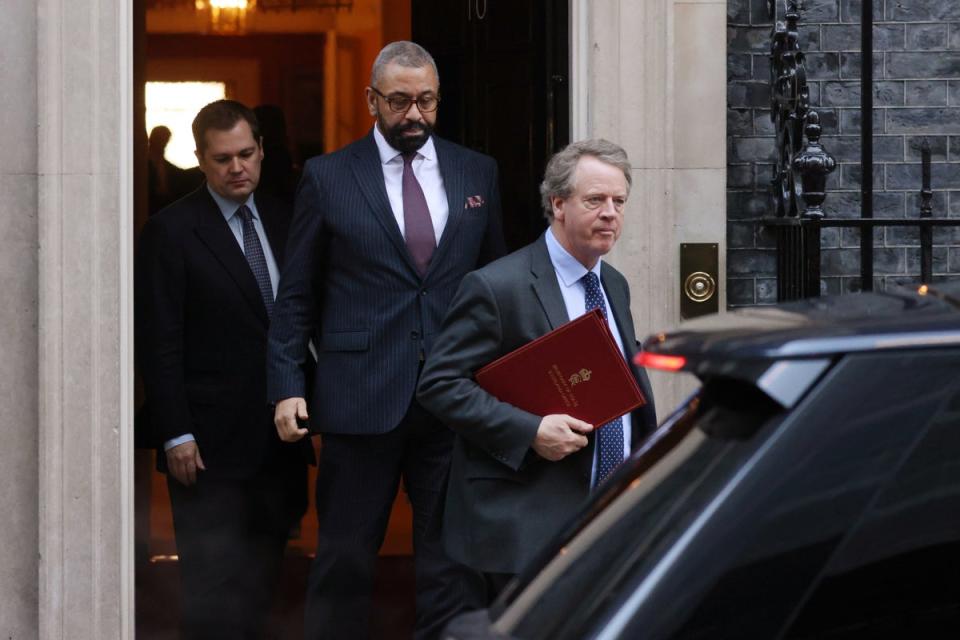Tory immigration row deepens as minister says ‘strong arguments’ for Braverman’s Australia-style cap
Rishi Sunak was rocked by further rebellions on immigration, as a cabinet minister said there were “strong arguments” in favour of Suella Braverman’s proposal for an overall cap on migrant numbers.
Immigration minister Robert Jenrick, a close ally of the sacked home secretary, suggested he was keen to consider her idea of a radical “Australian-style” cap on annual net migration numbers.
It came as fellow Tory minister Lee Anderson openly backed Ms Braverman’s plan in the Commons – saying it was “about time” the government brought in a cap to crack down on record-high numbers.
In other developments, Mr Sunak’s ally William Hague warned the PM that he must find another country willing to accept deported asylum seekers if his Rwanda plan fails.
It comes as Mr Sunak is said to have been warned by government lawyers that trying to opt out of the European Convention on Human Rights (ECHR) for his revised Rwanda plan won’t work.
The Tory PM is under huge pressure to deliver fresh ideas to crack down on both legal and illegal migration, after net arrivals hit a record high of 745,000 and the Supreme Court ruled against the Rwanda plan.
Mr Anderson, the outspoken right-wing deputy chair of the party, asked Mr Jenrick in the Commons: “Isn’t it about time, minister, that we had a cap on migration, and put some clear divide between us and that lot over there?”
Mr Jenrick told Mr Anderson that he “speaks for my constituents” and promised “fundamental reforms” to the visa system – before hinting that he has raised the idea of an overall cap with Mr Sunak.
“There are definitely strong arguments for using caps, whether in general or on specific visas – but these are conversations that we need to conclude within government,” said Mr Jenrick.

Mr Jenrick also appeared to confirm he was pushing Mr Sunak to raise salary thresholds for overseas NHS and care staff, having reportedly submitted a five-point plan of his own to No 10.
Right-wing Tory MP Edward Leigh said wages in the care home sector had to go up to stop so many arrivals from overseas. He added: “We know [Mr Jenrick] is on the right side – he’s just got to persuade the prime minister now.”
Not taken aback by the suggestion he was at odds with the PM, Mr Jenrick replied by saying Mr Leigh was “absolutely right and I agree with everything he said”.
Mr Jenrick also confirmed he was pushing for a crackdown on the number of dependents coming with foreign workers. “There is a strong argument for saying that it is unsustainable for the country to continue to take so many dependents.”
Senior Tory right-winger John Hayes – another close ally of Ms Braverman – told Mr Jenrick: “We are relying on him to sort this out because we know he shares our concerns.” Mr Hayes previously told The Independent that the immigration minister was a “true believer”.
Mr Jenrick also told MPs that his own immigration plan “would have been brought to the House before last Christmas if I could have done” – hinting that it had been blocked by No 10. A No 10 spokesperson responded: “I don’t know what specifically he is referring to.”

Meanwhile, former Tory leader Lord Hague, a close ally of Mr Sunak, warned the PM that he may have to find another deportation deal partner to make his “stop the boats” policy work.
“If it wasn’t Rwanda it would have to be somewhere else,” said Lord Hague on the prospect that Mr Sunak will not be able to get one-way flights to the central African country off the ground.
Lord Hague told Times Radio: “They have got to have some aspect of this policy that shows that if you come to Britain illegally you are going to get removed from it … So I think that is a necessary component, one way or another.”
The under-pressure PM is thought to be mulling over a plan to use a “notwithstanding” clause in his new emergency Rwanda legislation to direct British judges to ignore the ECHR.
But the PM was said to have been warned of huge legal risks at a meeting on Saturday with home secretary James Cleverly, justice secretary Alex Chalk and attorney general Victoria Prentis.
Legal advice heard at the meeting warned that such a move to flout the convention could lead to further challenges on the grounds that the UK was not meeting its human rights obligation, according to The Times.
Asked if disapplying the ECHR had been ruled out of the Rwanda legislation, Mr Sunak’s spokesman said: “No … there are policy discussions ongoing about how we meet that objective [to stop the boats]”.

Senior Tory Sir Robert Buckland has warned against any moves to disapply the ECHR – and said the Rwanda plan was not the “be all and end all”.
“Unless the government does more, unless Rwanda does more, to satisfy everybody that it’s a safe country then we will continue to struggle with the problems that we saw up to and including the Supreme Court judgement,” he told GB News.
Mr Cleverly has angered the Tory right after saying the Rwanda plan was not the “be all and end all”. The new home secretary is also seen as suspect among hardliners because he is known to be opposed to moves to opt out of the ECHR, and has not denied calling the Rwanda plan “bats***”.
Mr Cleverly was set to meet Tory MPs later on Tuesday amid growing backbench anger. Allies told The Telegraph that he had become a “flak magnet” for anger over the Rwanda policy and net migration levels.
Labour’s shadow home secretary Yvette Cooper mocked Mr Cleverly’s problems with Tory right-wingers. She told the Commons: “The problem seems to be that he thinks his Rwanda policy is bats***, that’s driven his backbenchers apes*** and now his whole party is in deep shambles.”
Ms Cooper also took a swipe at Mr Jenrick, saying the immigration minister “has been everywhere madly briefing all his ideas”, before asking: “Who speaks for the government?”
Senior Tory Sir Jacob Rees-Mogg launched a new attack on Mr Sunak over immigration – calling his government the most “inert” since the reign of Henry VI in the 15th century.
The former cabinet minister said current levels of migration “let down an electorate” and “could cost the Tory party the next election”.
A majority of voters want lower immigration overall, according to new polling for More in Common. But when asked about specific professions, the public are more likely to say that levels of immigration for each group should remain the same or be increased.
Only 19 per cent say overall net migration levels should be increased, versus 53 per cent who think it should be reduced. This is particularly high among voters who have abandoned the Tories since 2019 – with 79 per cent of them saying immigration should be cut.


